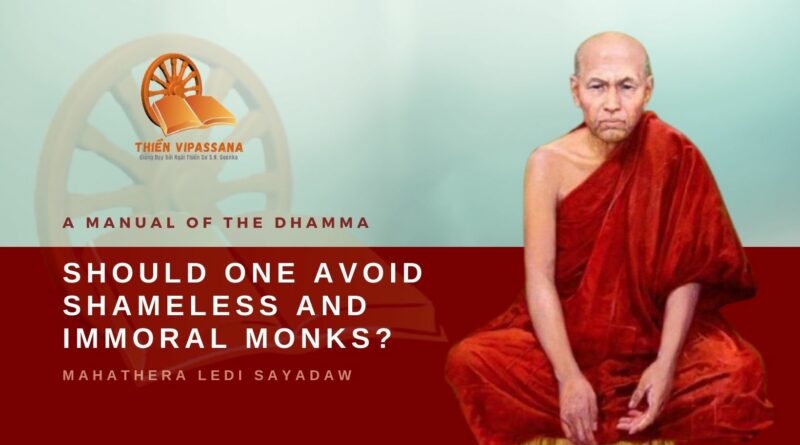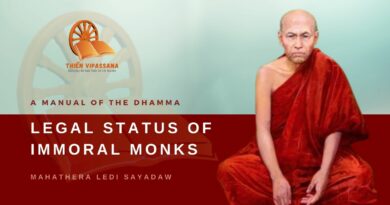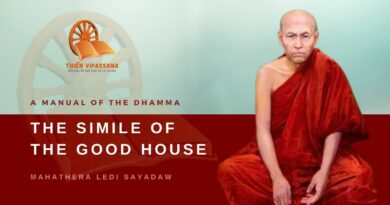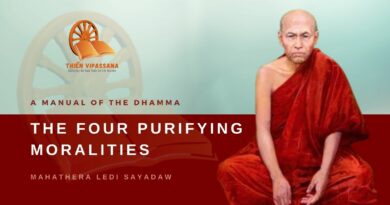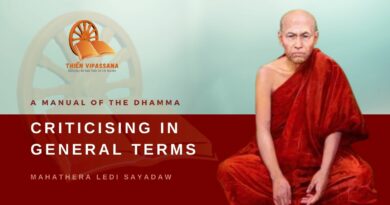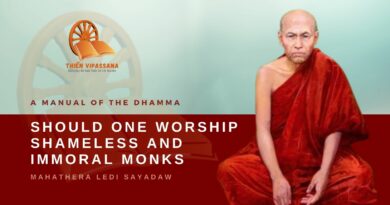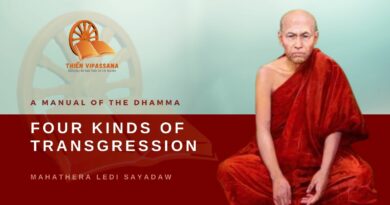Should One Avoid Shameless and Immoral Monks?
Questions two and three will be answered together as they are related. Let us recapitulate the two questions:
“Should those who know the truth about shameless and immoral monks refrain from associating with and paying respect to them? Does this agree with the verse in the Maṅgala Sutta that advises one to avoid the foolish? Is a lay person who shows disregard by shunning immoral and shameless monks following the Maṅgala Dhamma? We would like to hear evidence and case histories from the scriptures regarding good or bad results from this act.”
“Should those who know the truth about shameless and immoral monks continue to pay respect and offer requisites? Are they following the Maṅgala Dhamma that advises us to associate with the wise? Is this behaviour following the advice given in the Maṅgala Sutta or not? Kindly give evidence and case histories regarding good or bad results from this act.”
To answer these questions one should understand the nature and characteristics of shameless and immoral monks. The famous Maṅgala Sutta emphasises the nature of foolish or wise persons. In the injunction calling for associating only with the wise, the nature of good and bad persons is stressed. Here the Buddha taught the nature of the pious and the impious. In this subtle matter one must make distinctions to know the respective basis of each type.
- Moral (susīla) and immoral (dussīla).⁷
- Foolish (bāla) and wise (paṇḍita).
- A good man (sappurisa) and a bad man (asappurisa).
Thus there are three pairs of persons with respect to their nature and characteristics.
In the Sarabaṅga Jātaka (Cattalisa Nipāta) the Buddha distinguishes three types. Sakka, the king of the gods, asks in detail regarding the nature of each personal characteristic as follows:
- Who is called moral (sīlavantaṃ) by the wise?
- Who is called wise (paññavantaṃ) by the wise?
- Who is called good (sappurisaṃ) by the wise?
- Who will never lose honour and respect?
These were the Bodhisatta’s answers to Sakka’s questions:
- Those who control their senses, avoiding any kind of physical, verbal, or mental evil, who refrain from lying even at the risk of their life, are called moral persons by the wise.
- Those who, possessing profound wisdom, can answer philosophical questions with their innate wisdom, having no selfish regard for themselves or others, who refrain from abusive words and coarse actions that harm oneself and others, but work for the welfare of humanity, are called wise by the wise.
- Those who are grateful, have a steady mind, possess the attributes of a good friend, respect the worthy, and diligently fulfil the duties of a friend, are called good by the wise.
- Those who possess morality, wisdom, and piety, gain confidence, show humility, share their possessions unselfishly with others, understand the words of the alms seeker, help others according to just principles, practice truthfulness and show civility, will never lose honour and respect.
We can summarise the above classifications on the basis of avoidance of immoral deeds or offences. These persons are moral persons as they possess the characteristics of a moral person.
Regarding the nature and characteristics of a wise person, we must consider three factors:
- The ability to answer deep questions effectively and directly.
- Avoidance of physical and vocal misconduct, especially harsh words that harm the welfare of oneself and others.
- Whenever the opportunity arises one can work for the welfare of oneself and others.
Regarding the nature and characteristics of a good person, we must consider four factors:
- The ability to know and acknowledge the gratitude due to others.
- Possession of the qualifications of a good friend.
- Ability to associate with the wise.
- Willingness to help the poor and the needy, with the necessary skill to perform appropriate duties energetically.
Regarding the nature and characteristics of a pious and honourable person we must note the above factors, with the addition of confidence and humility.
Then Sakka asked again, “Which is the best among morality, honour, goodness, and wisdom?”
The bodhisatta answered: “The sages declare that just as the moon is the brightest among the stars, among morality, honour, goodness, and wisdom, wisdom is the chief and best of all, because all good conduct, honour, and good character must follow its lead.” In other words all must follow the lead of a wise man.
In the text are other questions and answers regarding how to gain wisdom, etc., but we omit them here as they are not relevant.
Among the four good factors mentioned above, the first three are the main points to remember in our discussion of types of monks. Among the first three, we may further distinguish those who lack morality as shameless or immoral, as explained earlier. One lacking goodness can easily accumulate the characteristics of a shameless and immoral person too. Due to lack of wisdom one will take on the nature and characteristics of a fool. Lack of piety and respect will make one a bad person, taking on the nature and requisite factors of a bad man. Thus there are three pairs:
- Moral (susīla) and immoral (dussīla).⁷
- Wise (paṇḍita) and foolish (bāla).
- Good (sappurisa) and bad (asappurisa).
Each has its own distinctive nature and characteristics in a different category.
Among the six types in three opposite pairs, one may associate with a moral person, a virtuous type, shown in the first category in the first position. Those having friendship in paying respect to a moral person can usually become moral too. Respecting or honouring an immoral or bad person can make one immoral or bad. Those who show respect and honour to the wise can usually become wise too. Friendship with a bad person makes one bad. However, if one makes friends with a pious, good person one usually becomes good. Obviously, the best person to associate with and respect is one who possesses all three virtues: morality, wisdom, and goodness.
If a person honours and respects a moral, foolish, bad person he gradually becomes likewise. However, the presence of morality is good, so we must praise him for this aspect while we should condemn foolishness and badness.
Who is a moral, but foolish and bad monk? Some monks try their best to keep their precepts and follow the monks’ training. As they are ordinary persons, they sometimes break some disciplinary rules, falling into offences, but they purify these offences as soon as possible. They are therefore classified as moral monks. However, since they fail to study Dhamma and Abhidhamma, they are ignorant, so they are classified as foolish. Also, if they do not acknowledge the benefit received from others, they are bad monks in the technical sense. So they are coarse and uncultured persons.
I will now explain in detail the nature of a bad person. This feature manifests as ingratitude. He is blind to the benefits received from others, and refuses to pay honour and respect to the worthy. He breaks the rules of good friendship by changing his attitude if someone criticises him. Moreover, a bad person fails to seek knowledge and wisdom, or to make friendship with the wise. If he sees friends in need, he acts as if not seeing them, thus he does not acknowledge their former friendship. So if one of the asappurisa factors exists, he is classified as “bad” because of this characteristic. He is not a good monk. This explains the nature of the moral, but foolish, and bad monk.
With the shameless and bad, but wise monk, those who pay respect and help him, obtain similar characteristics themselves. So we must praise a devotee who becomes wise as his teacher is also wise. However, as the shameless and bad aspects are present, we must blame both the devotee and the monk. Herein, the term “wise” only means well-educated in Sutta, Vinaya, and Abhidhamma. So we call a monk “wise” though he lacks the other two good qualities. However, since he breaks the Vinaya rules very often and does not care to restrain his senses, we also classify him as shameless. As he fails to acknowledge the benefit he receives from others and has other characteristics of a bad person, we call him “bad.” Indeed, he is not a good monk in these aspects. The above factors show the characteristics of a shameless and bad, but wise monk.
Following this method of classifying monks, many monks of mixed triple types can be found for further examination. One can see that most monks, like most lay persons, are of mixed triple types — a compound of good and bad features. This type is common everywhere. To befriend, honour, and support the moral, wise, and good monk is best, if possible. These are the best persons in the world, bringing the greatest benefits and welfare for all. They are worthy of respect and honour in all essential aspects.
If however, a devotee fails to find this ideal type, he needs to cultivate foresight and culture in choosing and helping a particular monk for worship, honour, and almsgiving. He needs intuitive skill in dealing with monks with mixed good and bad qualities.

